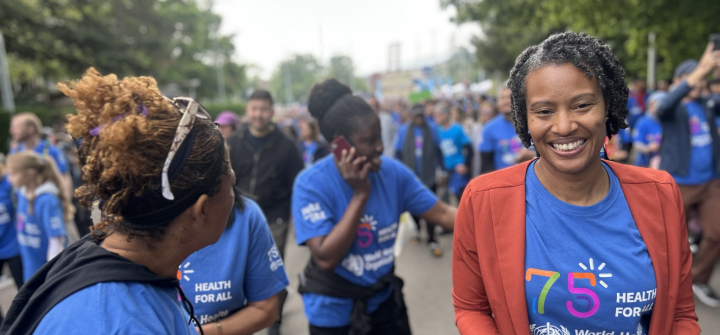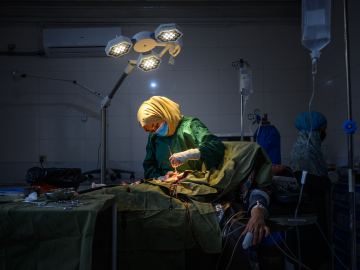Loyce Pace: U.S. Priorities at the 77th World Health Assembly
The long-discussed pandemic agreement, the crisis in Gaza, WHO reform, and other priority issues will be awaiting delegates from 194 nations when the 77th World Health Assembly convenes on May 27.
Among the delegates will be Loyce Pace, the assistant secretary for Global Affairs in the U.S. Department of Health and Human Services (HHS). When HHS Secretary Xavier Becerra isn’t in Geneva, Pace will be heading up the U.S. delegation and negotiating any outstanding issues related to the 15 or so resolutions being considered, among other topics.
In an interview with GHN, Pace, MPH, discusses the U.S. position on the pandemic agreement and changes to the International Health Regulations, and other issues.
What are the big U.S. priorities for this year's WHA?
Broadly speaking, we want to make sure that we continue to have the important conversations around global health security, and not just around response or emergency mode. Preparedness or prevention is just as important.
Also, we need to get back to basics when it comes to global health access overall, and explicitly equity across global health services and other issues.
A third priority for the U.S. is to make sure we have a sound WHO. We talked about WHO reform for a number of years—and WHO resources. The [WHO] is going to be unveiling their draft program of work, which is their strategy for the next several years. And that, notably, is going to lift up some areas that are increasingly important for global health and for global health institutions to prioritize.
What is the U.S. position on the pandemic agreement?
We want an agreement, right? I think it's critically important that we have … an agreement that fills any gaps, particularly around the equity and access question. We've been at the table, working mightily with other governments for, goodness, two and a half years. Hopefully, that is a signal to the world that, that we're serious about this.
What would ideal preparedness for a new pandemic threat look like?
For us, we build on what we have and do even better than before. Now, I want to be careful about suggesting that our responses to date have failed entirely because in reality, there have been some important lessons and even some wins or successes. Ideally, we have the opportunity to make, for example, the information we share collectively, more timely, more transparent, more easy for donors like the U.S. or actors like WHO to act on. And that way we stand a fighting chance to respond to any potential emergency—but even more importantly, mitigate the consequences of fallout.
Most people would say that the global response to COVID-19 proved the need for a pandemic agreement. Why have the negotiations been so protracted and difficult?
Because it's a really tough problem to solve, right? I think because of what we've all experienced, we want to ensure that no one ever experiences it that way again. And the reality is that two and a half years is not a ton of time, especially with an ongoing response, to get it all right.
It’s obvious but notable that we've never done this before. In the case of the International Health Regulations, we have an existing framework that we're hoping to improve. And countries understand how to operationalize it. They've lived it. They've done it.
We were starting from scratch with the [pandemic] accord. And there's some obvious overlap between the health regulations and the accord. As we’re building this plane, it’s important to know what parts already exist. So sussing all that out has been part of the process and one of the reasons why it's felt like such a slog. But again, I am really hopeful and encouraged by all countries, including the U.S., remaining at the table, even till the bitter end, and really demonstrating a sincere commitment to some form of conclusion come WHA.
Debate over Article 12 in the draft agreement has been contentious. It calls on manufacturers to share up to 20% of vaccines, therapeutics, diagnostics, in a Public Health Emergency of International Concern. Does the U.S. support this?
Well, Article 12 is the whole ballgame, right? [If] we don't get that right, we essentially don't have the accord that we need. So, that has been a large focus.
We are certainly at the table for those conversations. We want to be sure that we land an agreement around Article 12. I want to be careful sharing too much of what has to date been closed-door conversations with governments. Those governments want to keep having [those conversations] with us. But we absolutely support the development and ultimately, the implementation of what that article entails both in terms of sharing data samples, genetic material, and the like, as well as, obviously sharing products and technologies.
We do recognize the leadership role we have, at least historically played in this space. And I think when we look back to COVID and the ways that we have tried to convene the world and spur action or commitments in the absence of an agreement like this, hopefully this is on brand for us to be some of the adults in the room to say, “Okay, guys, what do we need? And how can we get it in a way that serves everyone here, and ultimately, the people we're accountable to back home?”
Earlier this month, 49 Republican senators sent a letter to President Biden calling on him to reject any pandemic agreement and noted that treaties require agreement of two thirds of the Senate. Does this kind of opposition doom any U.S. participation in any pandemic treaty?
Obviously, we are going to follow the law to the letter. The reality is that we don’t know the form this agreement will take, even now. What we've been doing is trying to focus on the content, as much as the format, because whatever the U.S. does or doesn't sign on to is going to have implications for us and the rest of the world. This is one of the reasons why we are so keen to be part of any agreement, because we want to benefit from that. We are at the table making sure that the U.S. and Americans are served by the agreement.
Serious concerns have been raised about famine in Gaza. What will the U.S. message be at the World Health Assembly on this?
I defer to our USAID colleagues to speak more about our humanitarian response. What I can do is underscore that we are absolutely tracking the challenges and supporting WHO not only in how they respond but how they work with other organizations. Certainly, that's an essential issue when it comes to health and well-being. It needs to be resolved, just like the other health monitoring challenges we are tracking in the region currently.
What’s been your biggest lesson learned in representing the U.S. on global health issues in international forums like the World Health Assembly, UN General Assembly, etc.?
I think the biggest lesson is the power and influence I have. It might sound naive, but I hadn't fully appreciated how much heft I would carry walking into a room. And sometimes that burden is quite heavy. Actually often, it is. It means we have to get it right.
But also, it's rooted in who I am, too. I'm not just walking in as the U.S. government representative. I'm walking in as someone who advocated on these issues for decades. I'm walking in as someone who's actually done this work on the ground in Asia, in Africa, and elsewhere. I'm walking in as a different voice and face for the U.S. government: a Black woman who's never held this kind of position. Really, I can bring all of that professional and personal experience to bear in the room. And people know that about me. And people expect that from me and, I think, have been proud of some of the ways I've been able to show up differently, in all my diversity on these issues.
Ed. Note: This interview has been edited for length and clarity.
Join the 50,000+ subscribers in 170+ countries who rely on Global Health NOW summaries and exclusive articles for the latest public health news. Sign up for our free weekday newsletter, and please share the link with friends and colleagues
HHS Assistant Secretary Loyce Pace joins the “Walk the Talk” event celebrating WHO’s 75th anniversary before the 76th World Health Assembly on May 21, 2023, in Geneva. Courtesy: HHS





